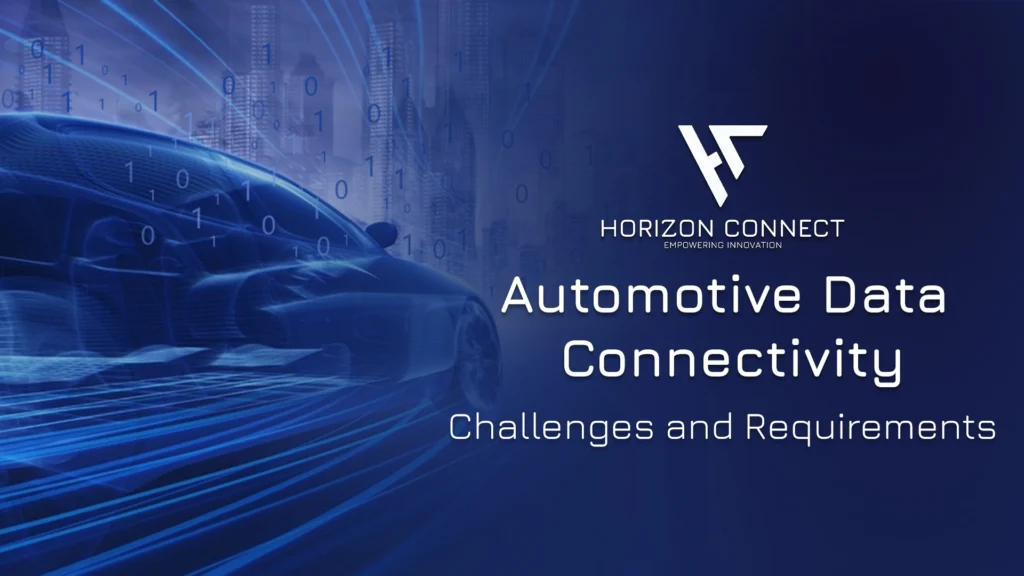
The automotive industry is rapidly evolving with the integration of advanced data connectivity technologies. As vehicles become smarter and more connected, the demand for robust and reliable data connectivity solutions is increasing. However, this transformation brings several challenges and requirements that need to be addressed to ensure the seamless operation of connected vehicles. Horizon Connect is dedicated to exploring these challenges and finding innovative solutions to pave the way for the future of automotive data connectivity.
The Importance of Data Connectivity in Modern Vehicles
Data connectivity is the backbone of modern vehicles, enabling a wide range of functionalities such as real-time navigation, over-the-air updates, vehicle-to-everything (V2X) communication, and advanced driver-assistance systems (ADAS). The ability to connect and exchange data with other vehicles, infrastructure, and the cloud is crucial for enhancing safety, efficiency, and user experience.
Key Challenges in Automotive Data Connectivity
1. Network Coverage and Reliability
Ensuring consistent and reliable network coverage is a significant challenge for automotive data connectivity. Vehicles travel through diverse environments, including urban areas, rural regions, and highways, where network coverage can vary significantly. Maintaining a stable connection in such varying conditions is critical for the functionality of connected services.
2. Latency and Bandwidth
Connected vehicles require low-latency and high-bandwidth communication to support real-time applications such as autonomous driving and V2X communication. Latency can impact the performance of these applications, leading to potential safety risks. Ensuring sufficient bandwidth is also crucial to handle the vast amounts of data generated by modern vehicles.
3. Cybersecurity
With increased connectivity comes the heightened risk of cyberattacks. Protecting vehicle systems and data from unauthorized access is paramount to ensure the safety and privacy of users. Automotive manufacturers must implement robust cybersecurity measures to safeguard connected vehicles from potential threats.
4. Interoperability
Connected vehicles need to communicate with various devices and systems, including other vehicles, traffic infrastructure, and cloud services. Ensuring interoperability between different technologies and standards is essential to enable seamless data exchange and coordination.
5. Data Management and Processing
The vast amounts of data generated by connected vehicles pose significant challenges in terms of storage, processing, and analysis. Efficient data management strategies are required to handle this data, extract valuable insights, and deliver real-time services to users.
Requirements for Effective Automotive Data Connectivity
1. Robust Network Infrastructure
A reliable and widespread network infrastructure is fundamental to support automotive data connectivity. Investments in expanding 5G networks and enhancing existing infrastructure are necessary to provide consistent coverage and support high-speed communication.
2. Advanced Communication Technologies
Implementing advanced communication technologies such as Dedicated Short-Range Communications (DSRC) and Cellular Vehicle-to-Everything (C-V2X) is crucial for enabling low-latency and high-bandwidth communication. These technologies facilitate real-time data exchange between vehicles and their surroundings.
3. Comprehensive Cybersecurity Measures
Automotive manufacturers must prioritize cybersecurity by incorporating multiple layers of protection, including encryption, secure boot mechanisms, and intrusion detection systems. Regular updates and patches are also essential to address emerging threats and vulnerabilities.
4. Standardization and Collaboration
Standardization of communication protocols and collaboration between industry stakeholders are vital for ensuring interoperability. Establishing common standards and frameworks will enable seamless data exchange and coordination across different systems and technologies.
5. Efficient Data Management Solutions
Deploying efficient data management solutions, such as edge computing and cloud-based platforms, is necessary to handle the massive amounts of data generated by connected vehicles. These solutions enable real-time data processing and analysis, supporting the delivery of timely and relevant services to users.
Horizon Connect: Leading the Way in Automotive Data Connectivity
At Horizon Connect, we are committed to addressing the challenges of automotive data connectivity by developing innovative solutions that enhance connectivity, security, and efficiency. Our team of experts is dedicated to creating a future where vehicles are seamlessly connected, safe, and intelligent. By investing in cutting-edge technologies and fostering industry collaboration, Horizon Connect is at the forefront of automotive data connectivity innovation.
Conclusion
Automotive data connectivity is a cornerstone of modern vehicle innovation, driving advancements in safety, efficiency, and user experience. However, addressing the challenges associated with network coverage, latency, cybersecurity, interoperability, and data management is crucial for realizing the full potential of connected vehicles. By investing in robust network infrastructure, advanced communication technologies, comprehensive cybersecurity measures, standardization, and efficient data management solutions, the automotive industry can overcome these challenges and pave the way for a connected and intelligent transportation future.


